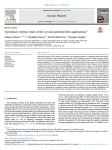Coluccia S., Ruocco M., Della Porta D., Langella G. (2025). Agrivoltaic systems: state of the art and potential field applications. Energy Reports, 01/12/2025, vol. 14, p. 1606-1633.
https://doi.org/10.1016/j.egyr.2025.07.038
https://doi.org/10.1016/j.egyr.2025.07.038
| Titre : | Agrivoltaic systems: state of the art and potential field applications (2025) |
| Auteurs : | S. Coluccia ; M. Ruocco ; D. Della Porta ; G. Langella |
| Type de document : | Article |
| Dans : | Energy Reports (vol. 14, December 2025) |
| Article en page(s) : | p. 1606-1633 |
| Langues : | Anglais |
| Langues du résumé : | Anglais |
| Catégories : |
Catégories principales 16 - TRANSPORT. INFRASTRUCTURE. ENERGIE ; 16.3 - EnergieThésaurus IAMM ENERGIE SOLAIRE ; AGRICULTURE |
| Mots-clés: | AGRIVOLTAISME |
| Résumé : | Agrivoltaic systems (AVS) represent an innovative and synergistic approach to integrating agricultural productivity with renewable energy generation, addressing critical challenges posed by climate change, resource scarcity, and increasing energy demand. This review systematically examines advancements, field applications, and the potential of AVS to enhance sustainability in the agricultural and energy sectors. AVS offer significant benefits, particularly in arid and semi-arid climates, where improvements in water balance and soil moisture retention have been documented. The study highlights the potential of AVS to enhance overall quality, integrate rainwater harvesting and energy storage technologies, and improve resource efficiency and system resilience. Challenges such as high installation costs, regulatory hurdles, and limited farmer adoption persist as barriers to widespread implementation. Research indicates that AVS contribute to climate mitigation by reducing COQ emissions and conserving biodiversity, promoting a more sustainable and resilient agricultural paradigm. Regulatory frameworks, such as those established by Italy's Ministry of Environment and Energy Security (MASE), are pivotal in incentivising experimental AVS systems. Future research should focus on agronomic models to optimise shading and irrigation, dynamic shading strategies aligned with crop phenology, and innovations in water and energy management. The developed review stands out for its focus on the implementation strategies of agrivoltaic models for specific crops and different latitudes. In this context, Decision Support System (DSS) play a crucial role in identifying the requirements that determine the efficiency of AVS. The analysis delves into the key criteria for optimising the integration between agricultural production and solar energy, highlighting how adopting advanced decision-making tools can enhance the system's sustainability and overall performance. |
| Cote : | En ligne |
| URL / DOI : | https://doi.org/10.1016/j.egyr.2025.07.038 |







